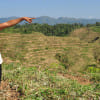A forest faces further forays

The Local Government Engineering Department (LGED) has taken an initiative to build a 5km road through the Ramu reserve forest, a move that forest officials and environmentalists say will bring disaster.
LGED's Cox's Bazar office prepared a draft proposal involving Tk 22 crore for the planned road to connect Ramu upazila with Cox's Bazar city at the Marine Drive along the sea beach.
But the LGED neither did an environmental assessment nor obtained permission from the Ministry of Environment, Forest and Climate Change to build the road through the heart of the reserve forest.
In a letter, the Forest Department warned the LGED against the move, and the initiative has since been put on hold.
The draft proposal, yet to be submitted for approval, comes only months after the government handed over 20 acres of the same reserve forest to the Bangladesh Football Federation (BFF) for building a residential training facility.
The handover on July 4 drew heavy criticism from environmentalists, who said the deal with BFF served a fresh blow to the fast-depleting forests in the region.
Now, if the government goes ahead with the road construction, it will mean felling of thousands of trees. It will also cause irreparable damages to wildlife habitats and elephant corridors, forest officials said.
The forest is a corridor and habitat for the endangered Asian Elephant in Cox's Bazar. It is also home to 117 tree species, 286 bird species and 26 mammal species including hoolock gibbon, leopard cat, fishing cat, tiger, Asian black bear, sloth bear and wild boar, according to Cox's Bazar Forest Department data.
"Construction of such a structure is prohibited under the Forest Act. They cannot do it without the consent of the Forest Department," Sarwar Alam, Divisional Forest officer of Cox's Bazar South Forest Department, told The Daily Star.
A joint study by the Bangladesh Environmental Lawyers' Association (BELA) and Youth Environment Society found 45,990 acres of the 260,046-acre forestland in Cox's Bazar have been illegally occupied by 43,568 people and 696 public and private organisations over the last decade.
Besides, 6,164 acres of forestland have been degraded due to the Rohingya influx while the government allotted 14,372 acres of forestland to several government organisations, according to the study published last year.
To protect the environment and natural resources, the government in 1999 declared Cox's Bazar Sea Beach and parts of the Ramu reserve forest as an Ecologically Critical Area under the Bangladesh Environment Conservation Act 1995.
Also, a 2002 circular of the Cabinet Division states that any organisation building any structures within a forest area must have clearance from the Forest Department.
"But the LGED is yet to seek clearance from the forest and environment ministry in this regard," Sawrar said.
Anisur Rahman, executive engineer of Cox's Bazar LGED, told The Daily Star they took the initiative on instructions of the Cox's Bazar deputy commissioner.
"The DC informed us that an international football training centre will be built in Ramu reserve forest. Following this, we made a preliminary estimate for the road construction to facilitate communication between Ramu Upazila and Cox's Bazar city," he said.
The 5km long and 18 feet wide road will stretch from Shahid ATM Zafar Alam Multi-Discipline Academy in Khuniapalong Union of Ramu upazila to Marine Drive adjacent to Cox's Bazar seashore, he said.
He acknowledged that they did not assess the environmental impacts yet.
"We have halted all activities after receiving a letter from the Forest Department telling us not to build the road through the reserve forest," he added.
He said they would abandon the project if the Forest Department and other relevant authorities did not approve it.
The forest minister and state minister did not respond to our calls and text messages.
Cox's Bazar DC Md Mamunur Rashid said the decision to construct this road was made in 2016.
"We verbally instructed the LGED to revive the initiative to make it easier for the foreign players and coaches coming to the international training facility of BFF in Ramu," he told The Daily Star.
Forest officials in Cox's Bazar said construction of the road would only promote illegal settlements in the reserve forest and further shrink the elephant corridor.
The Rohingya settlement has shut the Ukhia-Ghumdhum elephant corridor. Besides, the Panerchhra-Tulabagan corridor was damaged during the construction of Ramu Cantonment, which was completed in 2014, they said.
Emran Ahmed, a conservator of the forest's wildlife management and nature conservation division, said there are still at least 63 elephants living within the Ramu corridor.
"Construction of the road will destroy the elephant corridor. Elephants relocate locally as a result of habitat loss and reduced migration, which will result in more elephant-human conflicts," said Ahmed.
Sharif Jamil, general secretary of Bangladesh Paribesh Andolan (Bapa), said both public and private organisations are carrying out systematic deforestation in Cox's Bazar.
"Infrastructure development that disregards the dangers of deforestation is nothing but a breach of Bangladesh's commitment to the Glasgow Leader Declaration made at COP 26," said Jamil.
Bangladesh is among the 141 signatory countries that promised to end deforestation by 2030 in the 26th session of the Conference of the Parties (COP 26) in Glasgow last year.

 For all latest news, follow The Daily Star's Google News channel.
For all latest news, follow The Daily Star's Google News channel. 








Comments